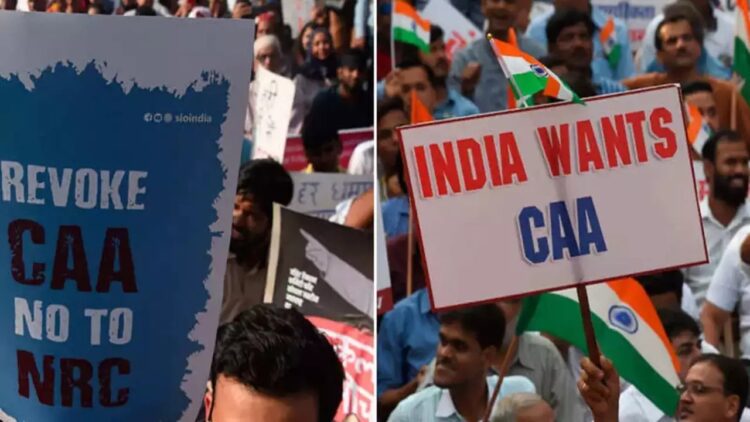In a significant development on Tuesday afternoon, the Supreme Court declined to stay the implementation of the Citizenship Amendment Act (CAA). The court, presided over by Chief Justice DY Chandrachud, Justice JB Pardiwala, and Justice Manoj Misra, also provided the government with a three-week window, until April 8, to address 237 petitions challenging the law that was recently notified, just days before the Lok Sabha elections.
During the proceedings, Solicitor-General Tushar Mehta, representing the government, requested four weeks’ time to respond comprehensively to the petitions. “We will have to file a detailed affidavit, on merits, to 237 petitions. 20 interim applications are already filed and many are in the pipeline. Realistically, we need four weeks,” Mehta argued before the court.
Among the petitioners were the Indian Union Muslim League, opposition leaders Jairam Ramesh of the Congress, and Mahua Moitra of the Trinamool. Despite not opposing the government’s request for additional time, the petitioners urged the bench to order a stay on the law’s implementation.
In 2019, after the citizenship bill was passed by Parliament, several legal challenges were mounted. However, the court refrained from halting implementation at that time as the rules had not been notified. Last week’s notification of the rules altered the situation, as argued by senior lawyer Kapil Sibal. “They said (in 2019) they were not notifying rules, so no stay was granted. There is no question of ‘rejection of stay’ (in the earlier instance)… then there were no rules, so there was no stay,” Sibal outlined, emphasizing the urgency of addressing the issue given the rules’ notification after a considerable delay.
The CAA, which allows non-Muslim migrants from neighboring countries to seek Indian citizenship, has sparked controversy since its inception. Opposition parties have criticized the timing of its implementation, alleging political motives ahead of elections, particularly in states like West Bengal and Assam.
Responding to the criticism, Home Minister Amit Shah reiterated the government’s stance, stressing that the CAA is constitutional and does not strip away anyone’s rights. He attributed the delay in implementation to the COVID-19 pandemic and emphasized that the legislation fulfills a promise made by the BJP in its 2019 manifesto.
As the legal battle over the CAA continues, the Supreme Court’s next hearing on the matter is scheduled for April 9.
In a significant development on Tuesday afternoon, the Supreme Court declined to stay the implementation of the Citizenship Amendment Act (CAA). The court, presided over by Chief Justice DY Chandrachud, Justice JB Pardiwala, and Justice Manoj Misra, also provided the government with a three-week window, until April 8, to address 237 petitions challenging the law that was recently notified, just days before the Lok Sabha elections.
During the proceedings, Solicitor-General Tushar Mehta, representing the government, requested four weeks’ time to respond comprehensively to the petitions. “We will have to file a detailed affidavit, on merits, to 237 petitions. 20 interim applications are already filed and many are in the pipeline. Realistically, we need four weeks,” Mehta argued before the court.
Among the petitioners were the Indian Union Muslim League, opposition leaders Jairam Ramesh of the Congress, and Mahua Moitra of the Trinamool. Despite not opposing the government’s request for additional time, the petitioners urged the bench to order a stay on the law’s implementation.
In 2019, after the citizenship bill was passed by Parliament, several legal challenges were mounted. However, the court refrained from halting implementation at that time as the rules had not been notified. Last week’s notification of the rules altered the situation, as argued by senior lawyer Kapil Sibal. “They said (in 2019) they were not notifying rules, so no stay was granted. There is no question of ‘rejection of stay’ (in the earlier instance)… then there were no rules, so there was no stay,” Sibal outlined, emphasizing the urgency of addressing the issue given the rules’ notification after a considerable delay.
The CAA, which allows non-Muslim migrants from neighboring countries to seek Indian citizenship, has sparked controversy since its inception. Opposition parties have criticized the timing of its implementation, alleging political motives ahead of elections, particularly in states like West Bengal and Assam.
Responding to the criticism, Home Minister Amit Shah reiterated the government’s stance, stressing that the CAA is constitutional and does not strip away anyone’s rights. He attributed the delay in implementation to the COVID-19 pandemic and emphasized that the legislation fulfills a promise made by the BJP in its 2019 manifesto.
As the legal battle over the CAA continues, the Supreme Court’s next hearing on the matter is scheduled for April 9.

















Comments